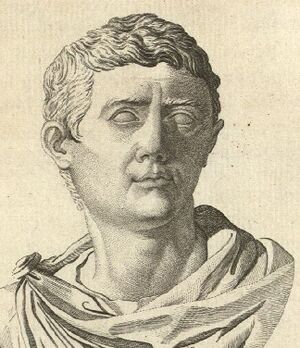Gnaeus Pompeius Trogus facts for kids
Quick facts for kids
Gnaeus Pompeius Trogus
|
|
|---|---|

Gnaeus Pompeius Trogus
|
|
| Occupation | Historian |
| Language | Latin |
| Citizenship | Roman Empire |
| Period | 1st century BC |
| Genres | History |
| Subject | Hellenistic period |
| Literary movement | Silver age of Latin literature |
| Notable work | Historiae Philippicae et Totius Mundi Origines et Terrae Situs |
Gnaeus Pompeius Trogus was an important historian from ancient Gaul, which is now part of France. He lived during the time of the Roman Emperor Augustus, around the 1st century BC. He is sometimes called Pompey Trogue in English.
Contents
Life of Pompeius Trogus
Pompeius Trogus came from a Celtic tribe called the Vocontii. His family had strong connections to powerful Roman leaders.
Family Connections
Trogus's grandfather served under the famous Roman general Pompey. Because of Pompey's help, his family became Roman citizens. They even took Pompey's first and middle names, Gnaeus Pompeius.
Trogus's father worked for Julius Caesar, another very famous Roman leader. He was Caesar's secretary and helped him with languages. Trogus himself was a very smart person who knew a lot about many different subjects.
Trogus's Writings
Pompeius Trogus wrote several books. He was interested in both natural science and history.
Books on Nature
Following the ideas of ancient Greek thinkers like Aristotle, Trogus wrote books about the natural history of animals and plants. These works showed his interest in the world around him.
The Philippic Histories
His most important work was a huge 44-book history called Historiae Philippicae et Totius Mundi Origines et Terrae Situs. This long title means "Philippic Histories and the Origin of the Whole World and the Places of the Earth."
What the History Covered
This book was mainly about the Macedonian Empire, which was started by Philip II of Macedon. It also covered the history of many parts of the world that came under the control of Alexander the Great and his successors. Trogus's history started with Ninus, a legendary founder of the city of Nineveh. It ended around the same time as the historian Livy's work, in 9 AD.
The book spent a lot of time on the history of the East, from the Assyrian Empire to the Parthian Empire. It also briefly mentioned early Roman history and the history of Spain.
Sources for His Work
Trogus used information from earlier Greek historians. Because he was from Gaul, many people believe he didn't get his information directly from these Greek sources. Instead, he probably used an existing summary or translation made by a Greek scholar.
Trogus's Writing Style
Pompeius Trogus had very clear ideas about how history should be written. He thought that historians like Sallust and Livy were wrong to put long, fancy speeches into the mouths of the people they wrote about. Trogus believed history should be more factual.
On the Jews
Pompeius Trogus also wrote about the Jewish people. He included their history as part of his larger history of the Seleucid Empire. His summary of the Jews is one of the most detailed descriptions found in ancient Latin writings.
Sections on Jewish History
His overview of the Jews was divided into three main parts:
- An ancient history of the Jews, combining different stories and traditions.
- A short description of the land of Judea.
- A history of the Jews starting from the time of the Persian Empire.
Trogus likely used Greek sources for this part of his work, possibly including writings by Timagenes.
Legacy of Trogus's Work
Sadly, the original text of Trogus's Philippic Histories has been lost over time. We only know about it because other writers quoted parts of it.
Justin's Summary
The most important way Trogus's work survived is through a summary written by a later historian named Justin. Justin only kept the parts he thought were most important or interesting. His summary ends with an event from 20 BC, when the Romans got back their military standards from the Parthians.
Even though we only have this summary, Trogus's work is still a very important source for learning about the ancient history of the East.
Influence on Other Writers
Trogus's books about animals and plants were often quoted by Pliny the Elder, another famous Roman writer.

